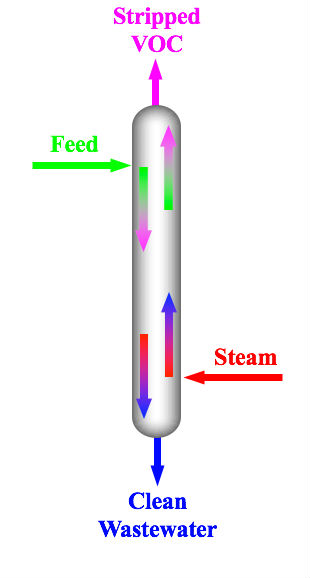Steam Stripping on:
[Wikipedia]
[Google]
[Amazon]
 Steam stripping is a process used in
Steam stripping is a process used in
 Steam stripping is a process used in
Steam stripping is a process used in petroleum refineries
An oil refinery or petroleum refinery is an industrial process plant where petroleum (crude oil) is transformed and refined into useful products such as gasoline (petrol), diesel fuel, asphalt base, fuel oils, heating oil, kerosene, liquefie ...
and petrochemical
Petrochemicals (sometimes abbreviated as petchems) are the chemical products obtained from petroleum by refining. Some chemical compounds made from petroleum are also obtained from other fossil fuels, such as coal or natural gas, or renewable sou ...
plants to remove volatile contaminants, such as hydrocarbon
In organic chemistry, a hydrocarbon is an organic compound consisting entirely of hydrogen and carbon. Hydrocarbons are examples of group 14 hydrides. Hydrocarbons are generally colourless and hydrophobic, and their odors are usually weak or ex ...
s and other volatile organic compounds
Volatile organic compounds (VOCs) are organic compounds that have a high vapour pressure at room temperature
Colloquially, "room temperature" is a range of air temperatures that most people prefer for indoor settings. It feels comfortable to a ...
(VOCs), from wastewater
Wastewater is water generated after the use of freshwater, raw water, drinking water or saline water in a variety of deliberate applications or processes. Another definition of wastewater is "Used water from any combination of domestic, industr ...
.Beychok, M.R., ''The Design of Sour Water Strippers'', Individual Paper 61, Proceedings of Seventh World Petroleum Congress, Mexico City, April 1967 It typically consists of passing a stream of superheated steam
Superheated steam is steam at a temperature higher than its vaporization point at the absolute pressure where the temperature is measured.
Superheated steam can therefore cool (lose internal energy) by some amount, resulting in a lowering of its ...
through the wastewater.
This method is effective when the volatile compounds have lower boiling point
The boiling point of a substance is the temperature at which the vapor pressure of a liquid equals the pressure surrounding the liquid and the liquid changes into a vapor.
The boiling point of a liquid varies depending upon the surrounding envir ...
s than water or have limited solubility
In chemistry, solubility is the ability of a substance, the solute, to form a solution with another substance, the solvent. Insolubility is the opposite property, the inability of the solute to form such a solution.
The extent of the solubil ...
in water.
References
Petroleum engineering Petrochemical industry Industrial emissions control {{environment-stub